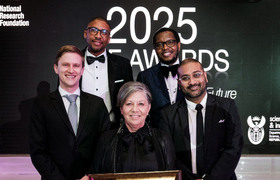UCT leads Africa once again, climbing in global rankings
09 October 2025 | Story Lara Dunwell. Photo Robin Thuynsma. Read time 4 min.
The University of Cape Town (UCT) has again affirmed its status as Africa’s top university, achieving a global rank of 164 in the Times Higher Education (THE) World University Rankings (WRU) 2026. With 2 191 universities ranked this year, UCT now sits in the top 7.5% of universities worldwide – a meaningful upward shift from its 2025 placing.
In 2025, UCT was ranked 180 out of 2 092 institutions, placing in the top 8.6 %. In 2024, the university ranked 167 out of a slightly smaller set of 1 907 universities, putting it in the top 8.75 %. Thus, in each of the last three years, UCT has improved its percentile position in a progressively more competitive field of entrants.
The university maintains its position as the highest-ranked university in South Africa and in Africa in previous years.
The results were officially unveiled at the THE World Academic Summit (WAS) 2025, held from 7 to 9 October 2025 in Thuwal, Saudi Arabia, hosted by King Abdullah University of Science and Technology (KAUST).
“To rise in both absolute terms and percentile position in a more crowded global arena is particularly gratifying.”
This summit is THE’s flagship global forum, with the ranking release forming one of its key moments as well as the auspicious mention that UCT will host the THE WAS on 29 September – 1 October in 2026. Held on the African continent for the first time, the event will be themed “Knowledge, justice and futures: Universities in the age of intelligence”.
The opportunity to host this gathering offers a platform to showcase the research, innovation and academic leadership emerging from South Africa and the wider African continent to hundreds of local and international delegates who’ll be visiting the Mother City next year.
“We are honoured to host a major THE event in 2026 and look forward to welcoming the global higher education community to Cape Town, where we can showcase not only our institution, but the intellectual vitality and potential of South Africa and the continent,” said UCT’s Vice-Chancellor, Professor Mosa Moshabela.
Methodology: What THE measures and what it means
While THE’s methodology focuses on core missions – teaching, research, knowledge transfer/industry and international outlook, UCT acknowledges that such frameworks, while important, can underweight and in some instances even omit vital dimensions like local community engagement, transformational work and service to society – indicators which are especially central to institutions in the Global South.
In the 2026 ranking cycle, THE uses 18 performance indicators, organised into five pillars:
- Teaching (the learning environment) – weighted at 29.5%
- Research environment (volume, income, reputation) – weighted at 29%
- Research quality (citations, research strength, excellence, influence) – weighted at 30%
- International outlook (staff, students, research collaboration) – weighted at 7.5%
- Industry (income, patents) – weighted at 4%
Research Environment and Research Quality are key differentiators in the research-intensive domain.
To compute the ranking, THE converts each measure to a common scale – a statistical process that ensures universities of different sizes and contexts can be compared on equal terms before combining the results into overall scores. Inclusion in the rankings also requires meeting eligibility criteria such as minimum publication output, data submission and others.
Thus, UCT’s ranking is not derived from a single metric, but reflects a balanced performance across teaching, research, international engagement and industry interface.
Key strengths: Research quality tops again
UCT’s strongest performance remains in the research quality pillar where it ranked 153rd in the world in 2026 – a strong improvement from 183rd in the previous year. The university also improved in the research environment pillar, rising from 188th to 166th.
“To rise in both absolute terms and percentile position in a more crowded global arena is particularly gratifying. Our continued leadership in the Research Quality pillar confirms that UCT is producing work that matters,” said Professor Moshabela.
These results demonstrate that UCT’s research continues to be widely cited and recognised internationally, reflecting both its productivity and influence within the global scholarly community.
 This work is licensed under a Creative Commons Attribution-NoDerivatives 4.0 International License.
This work is licensed under a Creative Commons Attribution-NoDerivatives 4.0 International License.
Please view the republishing articles page for more information.










